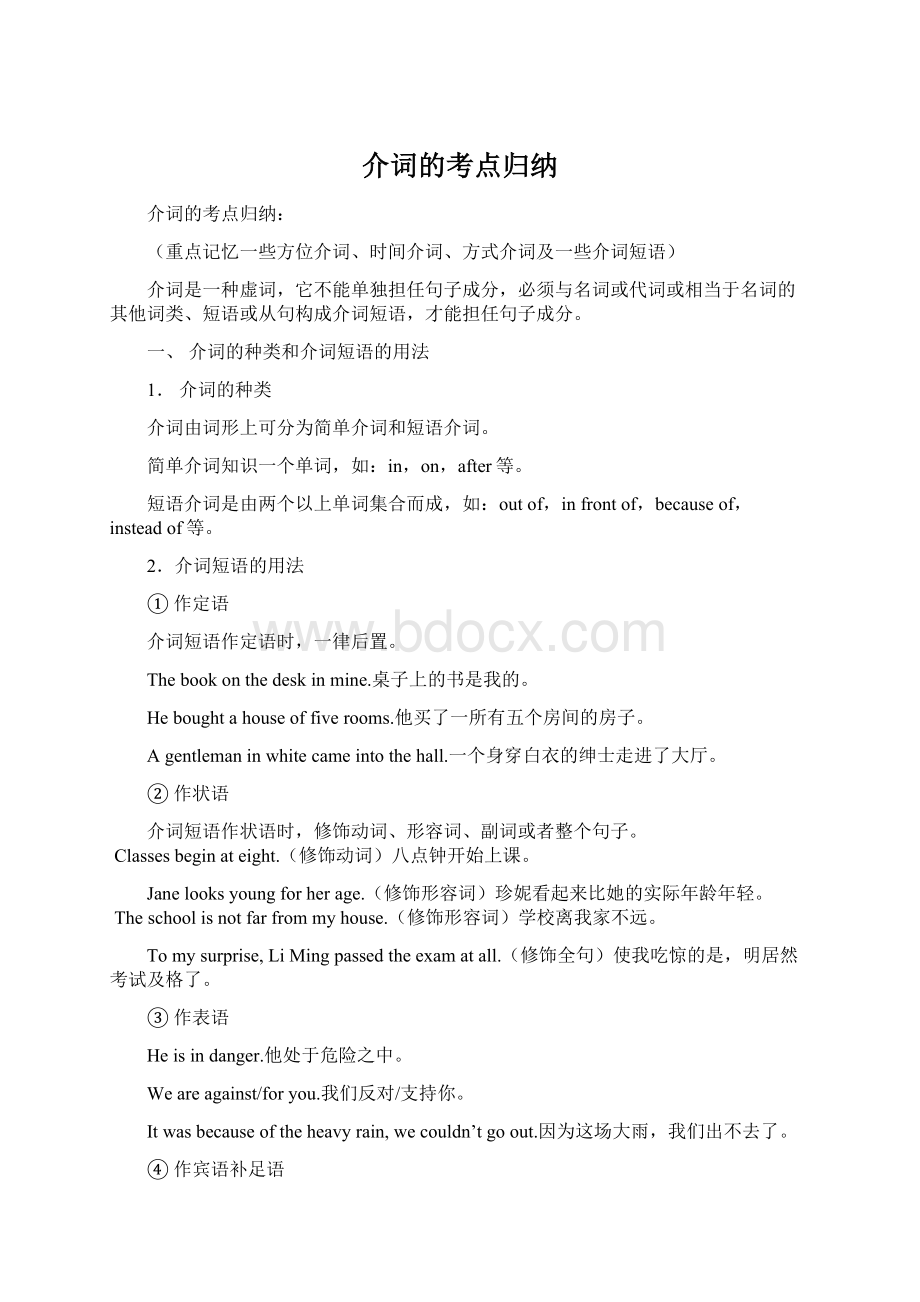介词的考点归纳.docx
《介词的考点归纳.docx》由会员分享,可在线阅读,更多相关《介词的考点归纳.docx(15页珍藏版)》请在冰豆网上搜索。

介词的考点归纳
介词的考点归纳:
(重点记忆一些方位介词、时间介词、方式介词及一些介词短语)
介词是一种虚词,它不能单独担任句子成分,必须与名词或代词或相当于名词的其他词类、短语或从句构成介词短语,才能担任句子成分。
一、 介词的种类和介词短语的用法
1. 介词的种类
介词由词形上可分为简单介词和短语介词。
简单介词知识一个单词,如:
in,on,after等。
短语介词是由两个以上单词集合而成,如:
out of,in front of,because of,instead of等。
2.介词短语的用法
① 作定语
介词短语作定语时,一律后置。
The book on the desk in mine.桌子上的书是我的。
He bought a house of five rooms.他买了一所有五个房间的房子。
A gentleman in white came into the hall.一个身穿白衣的绅士走进了大厅。
② 作状语
介词短语作状语时,修饰动词、形容词、副词或者整个句子。
Classes begin at eight.(修饰动词)八点钟开始上课。
Jane looks young for her age.(修饰形容词)珍妮看起来比她的实际年龄年轻。
The school is not far from my house.(修饰形容词)学校离我家不远。
To my surprise, Li Ming passed the exam at all.(修饰全句)使我吃惊的是,明居然考试及格了。
③ 作表语
He is in danger.他处于危险之中。
We are against/for you.我们反对/支持你。
It was because of the heavy rain, we couldn’t go out.因为这场大雨,我们出不去了。
④ 作宾语补足语
Make yourself at home.放松一些,就和在你自己家一样。
We made him out of danger.我们使他脱离了危险。
二.表示时间的介词
表示年、月、日、时刻等用at,in,on
表示时间的前后用in,before,after
表示期限等用by,until,till
表示期间等用for,during,through
表示时间的起点等用from,since
表示时间的经过等用in,within
1.at、in、on用在时间上的区别:
A.at+钟点/时间点/时间某一时刻
(at9:
00,at lunch,at breakfast,at noon,atnight,at that time, at the moment)
B.in+某年/某月/某年某月/某个季节/某个世纪/泛指的早上/下午/晚上
in the morning
in the afternoon
in the evening
in the 21st century
in September; in May
in1995
in the holiday
in summer
C.on+日期/星期/具体的某一天/具体的某一天的上午、下午、晚上
on Monday
on Tuesday morning
on May 4th
on a cold night
onasunnymorning
on the night of July(the)first在七月一日的夜晚
注意:
表示时间的名词前有this,last,next,every等修饰时,其前面不加介词。
this morning今天早上;last Monday上周一;every week每周
巩固练习:
选择用at、in、on填空:
1._______10:
402.________2005
3.________June3,20144._________theafternoon
5.________May,20126.________winter
7.________Friday8._______the21stcentury
9._______ahotsummernight10._________Saturdaymorning
2.in、after、before用在时间上的区别:
A.in在……后
in与将来时态连用时,表示“过多长时间以后”的意思,后面跟表示一段时间的词语。
He will be back in two months.
B.after在……后
After与过去时态连用时,后面才能跟表示一段时间的词语。
After与将来时态连用时,后面只能跟表示时间点的词语。
He will arrive after four o’clock.
He returned after a month.
She went to Nanjing last May,and she came back after a month.
C.before在……前
Wash your hands before dinner.
巩固练习:
选择用in、after填空:
1.HerfathercamebackfromFrance________twoyears.
2.MyparentswenttoShanghaiyesterdayandtheywillreturntoGuangzhou________threedays.
3.by,until/till 区别
A.by 在…前(时间);截止(到)….
How many English books had you read by the end of last year?
到去年年底以前你看过多少本英文书?
She had left by the time I arrived.我到时(之前)她已经走了。
例:
by the end of在„„底(之前) by then 到那时 by the time+从句 在„„之前
B.until/till直到…为止(时间)
He didn't go to sleep until/till 12 last night.
We didn’t begin to watch TV until/till nine o’clock.
4.for,during,through 区别
A. for 达…之久(表示经过了多少时间)
可以和一般现在时、过去时、将来时连用,但经常和完成时连用。
He has lived here for 20 years.他在这儿已经住了二十年了。
We will stay in the city for two days.我们要在这座城市呆两天。
B. during在…期间 (后决不能跟表数字的名词)
they are going to have a good rest during the summer holidays.暑假中他们打算好好休息一下。
C. through一直…(从开始到结束)
They played the cards through the night.他们打了一整夜的牌。
He stayed in London through the winter.他整个冬天都待在伦敦。
5.from,since区别
A. from从…起(时间) 表示“从…开始”时,一般都是用词组from„to„,The meeting will be held from eight to ten.这个会议将从8点开到10点。
B. since自从…以来(表示从以前某时一直到现在仍在继续)用于现在完成时后跟时间点
I have been sick since yesterday.
TomhasplayedthepianosinceJanuary.
6.in,within
A. in过…后(未来时间) 大多用在将来时(一般将来时和过去将来时)。
in an hour一小时之后
in a week or so大约一星期之后
he will be back in five hours.他五小时之后回来。
They said they would arrive here in a week.他们说他们一周后到达。
B. within不超过…的围 强调“在„„时间之”,没有时态的限制
within 3 hours 3小时之;within a week一周之
I must finish painting the cat within five minutes.
三.表示方位介词
表示场所的介词:
at,in,on,under,over,below,near,between,around
表示方向的介词:
into,out of,along,across,through,up,past
1.at, in, on
at一般指小地方
at school;at home;stand at the door;at a factory;at the bus stop;at the station
in一般指方或某个围之
in Beijing;in the world;in China;in the street;in bed;in the yard
on往往表示“在某个物体的表面”。
on the desk;on the map;on the screen;on the river;on the farm;on the floor
巩固练习
He arrived_______ Shanghai yesterday.
They arrived at a _______village before dark. There is a big hole_______the wall.
The teacher put up a picture _______ the wall.
2.on、above、over、below、under这些方位介词的区别:
on在……上面(与表面接触)
There are two maps on the wall.
above在……上面,表示在表面不接触的上方,不一定是正上方。
Our plane flew above the clouds.
over在……上面,表示表面不接触的上方,指垂直在上的正上方。
There is a light over Li Ming.
below在……下面,指位置低于某物或在某物的下方,但不一定在某物的正下方,其反义词是above。
There are a lot of fishes below the surface of the water.
under指在某物的正下方,有垂直在下的意思,其反义词是over。
The dog is under the table.
巩固练习:
选择用on、above、over、below、under填空:
1.Theywillbuildanewbridge________therivernearourschool.
2.Becareful!
Asnakeislying________theground!
3.Villages,rivers,lakesarebecomingsmallerandsmaller________theplane.
4.Afterhegotup,hedidn’tfindhisshoes________thebed.
5.Todayisaniceday.Youcanseeblueskyandwhiteclouds________ourheads.
3.along,cross,across,through,over,past,pass的用法区别:
along介词。
意思是“沿着”I was walking along the river when it began to rain.
cross动词。
意为“越过、渡过、横穿、横渡”
(road,street,grass,river,bridge,dessert)
across介词。
表示从一边到另一边,在事物的表面“横过”、“越过”
(road,street,grass,river,bridge,dessert)
through介词。
表示从部空间“穿过”、“通过”
(city,park,forest,window,door)
over介词。
意思是“越过”。
从物体的一边到另一边
Thedogjumpsoverthefence.
Weclimboverthemountainatlast.
pass动词“经过”(门外经过)
Ipassthepark
past介词“经过”(门外经过)
Every day he runs past the city hall.
Iwalkpastthepark.
巩固练习:
选择cross、across或through填空:
1.Thegirlhelpedtheoldmanwalk___________theroad.
2.Thechildrenwalked_________thedooronebyoneintothecinema.
3.Thecarran__________thebridgeandturnedrightintoapark.
4.Abeautifulriverruns__________ourhometown.
5.Hecouldswim__________theriverwhenhewasyoung.
6.Whenthesunshinewent____________thewindowintohisbedroom,hefinishedwritinghisbookintheend.
7.Don’t_________thebusystreetwhenthetrafficlightisred.
8.Sheaskedherlittlesonnotto__________theriverbecauseitwasraininghard.
9.The dog ran__________the grass.
10.The boy swam__________the river.
11.They walked __________the forest.
12.I pushed__________the crowds.
4.in front of, in the front of区别
in front of 表示“在某人或某物的前面”,在某个围以外;in the front of 表示“在……的前部”,在某个围以。
There are some tall trees in front of the building.
The teacher is sitting in the front of the classroom.
巩固练习
1.Peteris_____________me.
2.Thereisablackboardinthefrontofourclassroom.
3.Thereisalakeinfrontofourclassroom.
4.Theteacher'sdeskisinthefrontoftheclassroom.
5.between,among,around的区别:
A. between在两者之间
What’s the difference between A and B?
My teacher is sitting between Tom and Mike.
B. among后接人或物必须是三个或三个以上,在一群、一组或一个整体中间。
There is a beautiful house among the trees.
He is very popular among the students.
C. around环绕,在…周围,在…四周
We sat around the table.
巩固练习:
选择between,among,around填空:
1.MissLialwaysstands___________thestudentsandteachesthemhowtolearnEnglish.
2.Wewatchedafootballmatch__________JapanandChinayesterday.
3.Sheisagirlwithfewwords___________herclassmates.
4.Isawhimstanding___________thepeopleandsangsongsforthem.
5.Themanhastofly__________GuangzhouandShanghai.
6.Thereisalowwall__________thetworooms.
7.The earth moves___________ the sun.
8.Therearemanytrees___________thehouse.
四、其他介词
1.表示手段和材料的介词with,in,by
A.in+语言/墨水/颜色/声调用in时,后面加物质名词,不能加冠词。
She wrote a letter in black ink.
Don’t write it in pencil but in ink.
Can you speak in English?
B.with+工具用……(工具)用“with”时,后面的名词要加上冠词或代词。
Li Li cut her hand with a knife.
He wrote the letter with his new pen
C.by+方式用……方式交通工具bycarbybus
★一些固定的用法,如:
inaway在某种程度上
ina+adj.+way以……方式
inthis/thatway用这种/那种方式
intheway挡路
bytheway顺便问问
巩固练习:
选择介词in、by、with填空:
1.Don’ttalktotheoldman__________thisway.
2.Helikesdrawingpictures__________apencil.
3.__________theway,couldyoutellmehowIcangettothezoo?
4.WecanimproveourEnglish_________listeningtosomeEnglishradioprogrammes.
5.Hetoldhershecouldworkouttheproblem__________acleverway
6.Shewasaskedtosingasong__________English.
2.except/exceptfor/besides的区别
A.except“除了……之外”(同一类别比较,但排除在外,后跟短语、从句)
B.exceptfor“除了……之外”(不同类别比较,排除在外)
C.besides“除了……之外还有”(包括在,起强调作用,用法近似aswellas)
巩固练习:
用介词except/exceptfor/besides填空:
1.Iwanttobuysomefood,somedrinks________somesmallpresentsforthecomingChildren’sDay.
2.Everyoneishere________aboycalledJim.
3.Allofourstudents________PetercanworkoutthisproblemthoughPeterisweakinmath.
4.Thereisnothinginthebox________aletter.
5.Hisarticleisverygood________afewspellingmistakes.
五、介词短语
介词和动词、形容词或名词相结合后,形成复合词,有特定的意思。
如下:
1.动词+介词
look up查看,查(字典);look at注视;look for寻找play with sth.玩某物(玩耍);
think of想起,想到;hear from sb.收到某人的信; talk about sth.谈论某事;talk to/with sb.和某人谈论;listen to倾听call on sb.拜访某人; arrive at/in 到达;
take care of照顾;wait for等待;agree with 同意(某人) arrive at(in) 到达;ask for 询问 ;begin…with 从……开始;believe in 相信 ;break into 闯入; break off 打断;break out 爆发;breakup关系破裂;bring down 降低;bring in 引进; bring up 教育,培养 build up 建立;call back 回; call for 要求约请; call in 召来; call on 拜访 访问; care for 喜欢; carry on 继续开展 ;carry out 实行开展; check out 查明 结帐;clear up 整理,收拾; come about 发生,产生 come across (偶然)遇见;come out 出来 ;come to 共计 达到;compare…with 与……比较; compare to 比作;cut off 切断 ;depend on 依靠; dream of 梦想; fall off 下降 ;fall over 跌倒 ; get through 通过 ; give in 让步,屈服;give out 分发; give up 放弃 ;go abroad 出国 ;go through 浏览 grow up 生长; hear about 听说 ; lead to 导致 live on 靠……为生